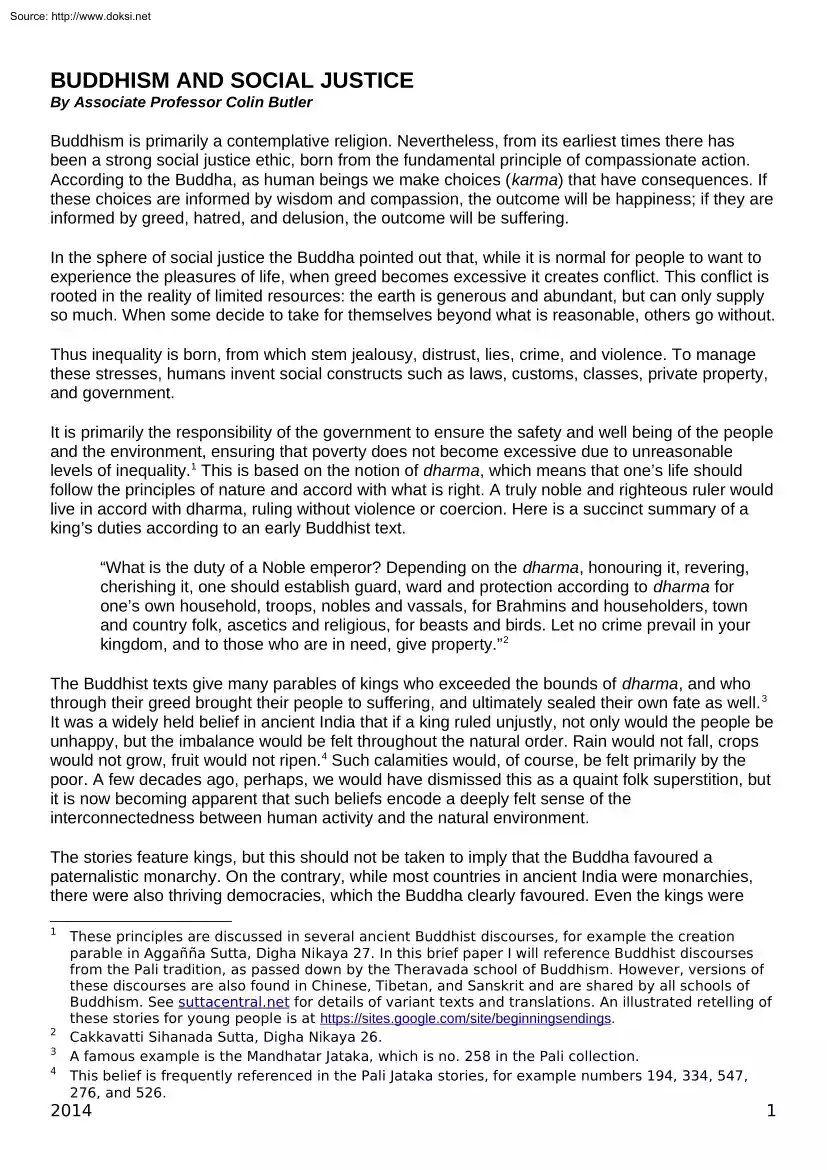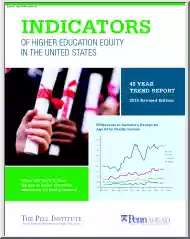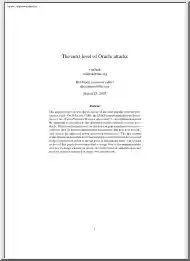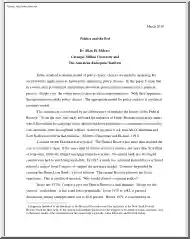A doksi online olvasásához kérlek jelentkezz be!

A doksi online olvasásához kérlek jelentkezz be!
Nincs még értékelés. Legyél Te az első!
Mit olvastak a többiek, ha ezzel végeztek?
Tartalmi kivonat
Source: http://www.doksinet BUDDHISM AND SOCIAL JUSTICE By Associate Professor Colin Butler Buddhism is primarily a contemplative religion. Nevertheless, from its earliest times there has been a strong social justice ethic, born from the fundamental principle of compassionate action. According to the Buddha, as human beings we make choices (karma) that have consequences. If these choices are informed by wisdom and compassion, the outcome will be happiness; if they are informed by greed, hatred, and delusion, the outcome will be suffering. In the sphere of social justice the Buddha pointed out that, while it is normal for people to want to experience the pleasures of life, when greed becomes excessive it creates conflict. This conflict is rooted in the reality of limited resources: the earth is generous and abundant, but can only supply so much. When some decide to take for themselves beyond what is reasonable, others go without Thus inequality is born, from which stem jealousy,
distrust, lies, crime, and violence. To manage these stresses, humans invent social constructs such as laws, customs, classes, private property, and government. It is primarily the responsibility of the government to ensure the safety and well being of the people and the environment, ensuring that poverty does not become excessive due to unreasonable levels of inequality.1 This is based on the notion of dharma, which means that one’s life should follow the principles of nature and accord with what is right. A truly noble and righteous ruler would live in accord with dharma, ruling without violence or coercion. Here is a succinct summary of a king’s duties according to an early Buddhist text. “What is the duty of a Noble emperor? Depending on the dharma, honouring it, revering, cherishing it, one should establish guard, ward and protection according to dharma for one’s own household, troops, nobles and vassals, for Brahmins and householders, town and country folk, ascetics and
religious, for beasts and birds. Let no crime prevail in your kingdom, and to those who are in need, give property.” 2 The Buddhist texts give many parables of kings who exceeded the bounds of dharma, and who through their greed brought their people to suffering, and ultimately sealed their own fate as well. 3 It was a widely held belief in ancient India that if a king ruled unjustly, not only would the people be unhappy, but the imbalance would be felt throughout the natural order. Rain would not fall, crops would not grow, fruit would not ripen. 4 Such calamities would, of course, be felt primarily by the poor. A few decades ago, perhaps, we would have dismissed this as a quaint folk superstition, but it is now becoming apparent that such beliefs encode a deeply felt sense of the interconnectedness between human activity and the natural environment. The stories feature kings, but this should not be taken to imply that the Buddha favoured a paternalistic monarchy. On the contrary,
while most countries in ancient India were monarchies, there were also thriving democracies, which the Buddha clearly favoured. Even the kings were 1 2 3 4 These principles are discussed in several ancient Buddhist discourses, for example the creation parable in Aggañña Sutta, Digha Nikaya 27. In this brief paper I will reference Buddhist discourses from the Pali tradition, as passed down by the Theravada school of Buddhism. However, versions of these discourses are also found in Chinese, Tibetan, and Sanskrit and are shared by all schools of Buddhism. See suttacentralnet for details of variant texts and translations An illustrated retelling of these stories for young people is at https://sites.googlecom/site/beginningsendings Cakkavatti Sihanada Sutta, Digha Nikaya 26. A famous example is the Mandhatar Jataka, which is no. 258 in the Pali collection This belief is frequently referenced in the Pali Jataka stories, for example numbers 194, 334, 547, 276, and 526. 2014 1 Source:
http://www.doksinet ultimately answerable to the people: the mythical first king is called Mahasammata, which means “Great Elected One”.5 This notion still inspires grass-roots sustainability and economic justice movements today.6 In the sphere of social justice, the greatest example of a ruler who followed the Buddha’s advice is King Ashoka (ca. 304–232 BCE) We know of Ashoka from Buddhist and other Indian legends, but also from his own words, inscribed on numerous edicts found over all India. 7 Ashoka inherited a vast empire over most of northern India, which he immediately proceeded to consolidate and extend with terrible loss of life. After his conversion to Buddhism, he felt a tremendous remorse for his acts, and expressed his sorrow and repentance. This fuelled an extraordinary policy of nonviolence by which he governed the largest empire in the world at the time Among many other innovations, he announced amnesty for prisoners and measures for their rehabilitation;
banned the slaughter of many kinds of animals; set up medicinal help for humans and animals; and established a system of messengers so the people could convey their concerns to their king. While Ashoka was a Buddhist, there is little that is specifically Buddhist in his polity. Rather, he spoke of dharma, of ruling in accord with principle of righteousness that were accepted by all religions in India. Central to his policy was his support of all religions: he said that one never helps one’s own religion by disparaging other religions, but rather by helping other religions one supports all religions. In modern times, the need for social justice has been articulated from multiple Buddhist perspectives. Many Buddhist countries suffering greatly under colonialism, and in response formulated notions of justice that harked back to authentic Buddhist principles. In Theravadin countries such ideals were grounded on the notion of the righteous governance of a people in accord with dharma.
Grassroots movements such as the Sri Lankan Sarvodaya work to apply the dharma on a village level, addressing the poverty and environmental damage that stem from social injustice.8 In the Mahayana lands to the north the ideal of the bodhisattva, who sacrifices their own welfare in service to others, inspired the emergence of so-called ‘Engaged Buddhism’, which stems from the ‘Humanistic Buddhism’ of the Taiwanese masters Taixu and Yin Shun and was brought to the world by the Vietnamese master Thich Nhat Hahn. 9 These approaches have inspired a fertile response among contemporary Buddhists. 10 The teaching on interconnectedness is seen to encapsulate a profound truth about ourselves in relation with the natural order.11 This has inspired reflections on Buddhism and the social order, 12 a re-evaluation of the role of women,13 and the gradual emergence of global Buddhist aid 5 Encyclopædia Britannica, 2011. Web 14 Jun 2011
<http://www.britannicacom/EBchecked/topic/357955/mahasammata> 6 http://livingheritage.org/lht-akc-lectureshtm 7 Translations of most of Ashoka’s edicts may be found at http://www.cscolostateedu/~malaiya/ashokahtml 8 http://www.sarvodayaorg/ 9 Thich Nhat Hahn’s “4 precepts of Engaged Buddhism” may be found at http://viewonbuddhism.org/resources/14 preceptshtml 10 For a lucid contemporary exploration, see David Loy, “Buddhism and Poverty”, http://www.zenoccidentalnet/articles1/loy1html 11 See the work of Joanna Macy at http://www.joannamacynet 12 See Ken Jones, “Buddhism and Social Action: An Exploration”. http://www.accesstoinsightorg/lib/authors/jones/wheel285html 2014 2 Source: http://www.doksinet organizations (see below). Such ethics have been considered in light of their relation with other faiths.14 Buddhist and Buddhist-influenced organisations working to promote social justice Buddhist Compassion Relief Tzu Chi Foundation, 15 was founded in Taiwan
in 1966, and now claims ten million volunteers globally. It has branches in dozens of countries, including Australia 16 This group has supported relief work in numerous countries, focusing particularly on disaster relief and donated medical care. By their example, they influence the determinants of social justice Mentioned above is the Sarvodaya ('Awakening of All') Shramadana (“donation of effort”) movement is the largest people's organization in Sri Lanka. 17 Starting in the 1950s, the largely voluntary effort of this group now embraces more than 15,000 villages. Rooted in Buddhist philosophy, Sarvodaya works with people of all faiths in this largely Buddhist, strife-ridden nation. At times Sarvodaya has faced criticism from the Sri Lankan authorities. The International Network of Engaged Buddhists, 18 based in Thailand (founded 1989), is an umbrella NGO which draws together diverse small organisations working mainly for development and human rights, going beyond
conventional dharma. Its founder, Sulak Sivaraksa, has also met political opposition, twice being charged with lèse majesté. Sulak has written extensively on issues related to social justice. The Karuna Trust,19 founded by the English monk Ven Sangharakshita in 1980, is the largest Buddhist NGO in the UK. It raises well over ₤1 million annually, for a combination of dharma and social projects. Karuna is especially identified with work to assist India’s Dalit community, millions of whom have converted to Buddhism, using religion as an innovative way to promote social justice. Many Dalits believe that the strictures of the caste system, endorsed by main stream Hinduism, are so terrible that conversion is the only escape. Millions have also converted to Christianity. In 2007 the American Buddhist monk, Ven. Bhikkhu Bodhi founded Buddhist Global Relief 20 in reaction to what he felt was a narrowly inward focus of American Buddhism, pursued to the neglect of the active dimension of
Buddhist compassion expressed through programs of social engagement.21 Their focus has mostly been on trying to reduce global hunger, especially by supporting local partners in developing countries to achieve self-sufficiency through improved food productivity. In Australia and the US, an organisation called Benevolent Organisation for Development Health & Insight (BODHI).22 This supports development projects, for health and education with partners in six Asian countries. BODHI was founded by Susan and Colin Butler, in 1989 BODHI is entirely secular; its volunteers, advisors and beneficiaries are of several faiths. 13 Karma Lekshe Tsomo (Ed.), Buddhist Women and Social Justice: Ideals, Challenges, and Achievements. SUNY Press, 2004 14 For example, Judith Simmer-Brown, ‘Suffering and Social Justice: A Buddhist Response to the Gospel of Luke.’ Buddhist-Christian Studies, Vol 16, pp 99-112 University of Hawai’i Press, 1996 15 http://www.tzuchiorg/ 16 http://www.tzuchiorgau/ 17
http://www.sarvodayaorg/ 18 www.inebnetworkorg/ 19 www.karunaorg/ 20 http://www.buddhistglobalrelieforg 21 https://www.facebookcom/pages/Buddhist-Global-Relief/140908022597845?sk=info 22 http://www.bodhinetau 2014 3 Source: http://www.doksinet In Australia, the peak Buddhist bodies the Federation of Australian Buddhist Councils and the Australian Sangha Association have in recent years been active in various areas of social justice. These include supporting a human rights charter for Australia, lobbying government for stronger action to protect the environment, working for a more compassionate prison system, especially in NSW, and working for a fairer and kinder approach to immigration. Many of these initiatives have been undertaken together with other faiths in Australia. The list above is far from complete. Thus, a gradually expanding network of Buddhist and Buddhist-influenced aid groups exists. But given the age of Buddhism and its large number of global followers, it is has
a much large scope for greater action to improve the global determinants of social justice, especially by working at a more structural level. Associate Professor Coin Butler National Centre for Epidemiology and Population Health College of Medicine Biology and Environment Australian University 2014 4
distrust, lies, crime, and violence. To manage these stresses, humans invent social constructs such as laws, customs, classes, private property, and government. It is primarily the responsibility of the government to ensure the safety and well being of the people and the environment, ensuring that poverty does not become excessive due to unreasonable levels of inequality.1 This is based on the notion of dharma, which means that one’s life should follow the principles of nature and accord with what is right. A truly noble and righteous ruler would live in accord with dharma, ruling without violence or coercion. Here is a succinct summary of a king’s duties according to an early Buddhist text. “What is the duty of a Noble emperor? Depending on the dharma, honouring it, revering, cherishing it, one should establish guard, ward and protection according to dharma for one’s own household, troops, nobles and vassals, for Brahmins and householders, town and country folk, ascetics and
religious, for beasts and birds. Let no crime prevail in your kingdom, and to those who are in need, give property.” 2 The Buddhist texts give many parables of kings who exceeded the bounds of dharma, and who through their greed brought their people to suffering, and ultimately sealed their own fate as well. 3 It was a widely held belief in ancient India that if a king ruled unjustly, not only would the people be unhappy, but the imbalance would be felt throughout the natural order. Rain would not fall, crops would not grow, fruit would not ripen. 4 Such calamities would, of course, be felt primarily by the poor. A few decades ago, perhaps, we would have dismissed this as a quaint folk superstition, but it is now becoming apparent that such beliefs encode a deeply felt sense of the interconnectedness between human activity and the natural environment. The stories feature kings, but this should not be taken to imply that the Buddha favoured a paternalistic monarchy. On the contrary,
while most countries in ancient India were monarchies, there were also thriving democracies, which the Buddha clearly favoured. Even the kings were 1 2 3 4 These principles are discussed in several ancient Buddhist discourses, for example the creation parable in Aggañña Sutta, Digha Nikaya 27. In this brief paper I will reference Buddhist discourses from the Pali tradition, as passed down by the Theravada school of Buddhism. However, versions of these discourses are also found in Chinese, Tibetan, and Sanskrit and are shared by all schools of Buddhism. See suttacentralnet for details of variant texts and translations An illustrated retelling of these stories for young people is at https://sites.googlecom/site/beginningsendings Cakkavatti Sihanada Sutta, Digha Nikaya 26. A famous example is the Mandhatar Jataka, which is no. 258 in the Pali collection This belief is frequently referenced in the Pali Jataka stories, for example numbers 194, 334, 547, 276, and 526. 2014 1 Source:
http://www.doksinet ultimately answerable to the people: the mythical first king is called Mahasammata, which means “Great Elected One”.5 This notion still inspires grass-roots sustainability and economic justice movements today.6 In the sphere of social justice, the greatest example of a ruler who followed the Buddha’s advice is King Ashoka (ca. 304–232 BCE) We know of Ashoka from Buddhist and other Indian legends, but also from his own words, inscribed on numerous edicts found over all India. 7 Ashoka inherited a vast empire over most of northern India, which he immediately proceeded to consolidate and extend with terrible loss of life. After his conversion to Buddhism, he felt a tremendous remorse for his acts, and expressed his sorrow and repentance. This fuelled an extraordinary policy of nonviolence by which he governed the largest empire in the world at the time Among many other innovations, he announced amnesty for prisoners and measures for their rehabilitation;
banned the slaughter of many kinds of animals; set up medicinal help for humans and animals; and established a system of messengers so the people could convey their concerns to their king. While Ashoka was a Buddhist, there is little that is specifically Buddhist in his polity. Rather, he spoke of dharma, of ruling in accord with principle of righteousness that were accepted by all religions in India. Central to his policy was his support of all religions: he said that one never helps one’s own religion by disparaging other religions, but rather by helping other religions one supports all religions. In modern times, the need for social justice has been articulated from multiple Buddhist perspectives. Many Buddhist countries suffering greatly under colonialism, and in response formulated notions of justice that harked back to authentic Buddhist principles. In Theravadin countries such ideals were grounded on the notion of the righteous governance of a people in accord with dharma.
Grassroots movements such as the Sri Lankan Sarvodaya work to apply the dharma on a village level, addressing the poverty and environmental damage that stem from social injustice.8 In the Mahayana lands to the north the ideal of the bodhisattva, who sacrifices their own welfare in service to others, inspired the emergence of so-called ‘Engaged Buddhism’, which stems from the ‘Humanistic Buddhism’ of the Taiwanese masters Taixu and Yin Shun and was brought to the world by the Vietnamese master Thich Nhat Hahn. 9 These approaches have inspired a fertile response among contemporary Buddhists. 10 The teaching on interconnectedness is seen to encapsulate a profound truth about ourselves in relation with the natural order.11 This has inspired reflections on Buddhism and the social order, 12 a re-evaluation of the role of women,13 and the gradual emergence of global Buddhist aid 5 Encyclopædia Britannica, 2011. Web 14 Jun 2011
<http://www.britannicacom/EBchecked/topic/357955/mahasammata> 6 http://livingheritage.org/lht-akc-lectureshtm 7 Translations of most of Ashoka’s edicts may be found at http://www.cscolostateedu/~malaiya/ashokahtml 8 http://www.sarvodayaorg/ 9 Thich Nhat Hahn’s “4 precepts of Engaged Buddhism” may be found at http://viewonbuddhism.org/resources/14 preceptshtml 10 For a lucid contemporary exploration, see David Loy, “Buddhism and Poverty”, http://www.zenoccidentalnet/articles1/loy1html 11 See the work of Joanna Macy at http://www.joannamacynet 12 See Ken Jones, “Buddhism and Social Action: An Exploration”. http://www.accesstoinsightorg/lib/authors/jones/wheel285html 2014 2 Source: http://www.doksinet organizations (see below). Such ethics have been considered in light of their relation with other faiths.14 Buddhist and Buddhist-influenced organisations working to promote social justice Buddhist Compassion Relief Tzu Chi Foundation, 15 was founded in Taiwan
in 1966, and now claims ten million volunteers globally. It has branches in dozens of countries, including Australia 16 This group has supported relief work in numerous countries, focusing particularly on disaster relief and donated medical care. By their example, they influence the determinants of social justice Mentioned above is the Sarvodaya ('Awakening of All') Shramadana (“donation of effort”) movement is the largest people's organization in Sri Lanka. 17 Starting in the 1950s, the largely voluntary effort of this group now embraces more than 15,000 villages. Rooted in Buddhist philosophy, Sarvodaya works with people of all faiths in this largely Buddhist, strife-ridden nation. At times Sarvodaya has faced criticism from the Sri Lankan authorities. The International Network of Engaged Buddhists, 18 based in Thailand (founded 1989), is an umbrella NGO which draws together diverse small organisations working mainly for development and human rights, going beyond
conventional dharma. Its founder, Sulak Sivaraksa, has also met political opposition, twice being charged with lèse majesté. Sulak has written extensively on issues related to social justice. The Karuna Trust,19 founded by the English monk Ven Sangharakshita in 1980, is the largest Buddhist NGO in the UK. It raises well over ₤1 million annually, for a combination of dharma and social projects. Karuna is especially identified with work to assist India’s Dalit community, millions of whom have converted to Buddhism, using religion as an innovative way to promote social justice. Many Dalits believe that the strictures of the caste system, endorsed by main stream Hinduism, are so terrible that conversion is the only escape. Millions have also converted to Christianity. In 2007 the American Buddhist monk, Ven. Bhikkhu Bodhi founded Buddhist Global Relief 20 in reaction to what he felt was a narrowly inward focus of American Buddhism, pursued to the neglect of the active dimension of
Buddhist compassion expressed through programs of social engagement.21 Their focus has mostly been on trying to reduce global hunger, especially by supporting local partners in developing countries to achieve self-sufficiency through improved food productivity. In Australia and the US, an organisation called Benevolent Organisation for Development Health & Insight (BODHI).22 This supports development projects, for health and education with partners in six Asian countries. BODHI was founded by Susan and Colin Butler, in 1989 BODHI is entirely secular; its volunteers, advisors and beneficiaries are of several faiths. 13 Karma Lekshe Tsomo (Ed.), Buddhist Women and Social Justice: Ideals, Challenges, and Achievements. SUNY Press, 2004 14 For example, Judith Simmer-Brown, ‘Suffering and Social Justice: A Buddhist Response to the Gospel of Luke.’ Buddhist-Christian Studies, Vol 16, pp 99-112 University of Hawai’i Press, 1996 15 http://www.tzuchiorg/ 16 http://www.tzuchiorgau/ 17
http://www.sarvodayaorg/ 18 www.inebnetworkorg/ 19 www.karunaorg/ 20 http://www.buddhistglobalrelieforg 21 https://www.facebookcom/pages/Buddhist-Global-Relief/140908022597845?sk=info 22 http://www.bodhinetau 2014 3 Source: http://www.doksinet In Australia, the peak Buddhist bodies the Federation of Australian Buddhist Councils and the Australian Sangha Association have in recent years been active in various areas of social justice. These include supporting a human rights charter for Australia, lobbying government for stronger action to protect the environment, working for a more compassionate prison system, especially in NSW, and working for a fairer and kinder approach to immigration. Many of these initiatives have been undertaken together with other faiths in Australia. The list above is far from complete. Thus, a gradually expanding network of Buddhist and Buddhist-influenced aid groups exists. But given the age of Buddhism and its large number of global followers, it is has
a much large scope for greater action to improve the global determinants of social justice, especially by working at a more structural level. Associate Professor Coin Butler National Centre for Epidemiology and Population Health College of Medicine Biology and Environment Australian University 2014 4




 Jellemzően a vállalkozás beindítása előtt elkészített tanulmány, de készülhet már meglévő vállalkozás esetében is. Az üzleti tervezés egy olyan tervezési módszer, amely keretet a cég céljainak eléréséhez. Írásunk módszertani útmutatóként szolgál azoknak, akik érdeklődnek az üzleti tervezés iránt.
Jellemzően a vállalkozás beindítása előtt elkészített tanulmány, de készülhet már meglévő vállalkozás esetében is. Az üzleti tervezés egy olyan tervezési módszer, amely keretet a cég céljainak eléréséhez. Írásunk módszertani útmutatóként szolgál azoknak, akik érdeklődnek az üzleti tervezés iránt.